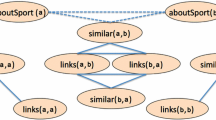Abstract
One of the main problems in using logic for solving problems is the high computational costs involved in inference. In this paper, we propose the use of a notion of relevance in order to cut the search space for a solution. Instead of trying to infer a formula α directly from a large knowledge base K, we consider first only the most relevant sentences in K for the proof. If those are not enough, the set can be increased until, at the worst case, we consider the whole base K.
We show how to define a notion of relevance for first-order logic with equality and analyze the results of implementing the method and testing it over more than 700 problems from the TPTP problem library.
Preview
Unable to display preview. Download preview PDF.
Similar content being viewed by others
References
Hamscher, W., Console, L., de Kleer, J. (eds.): Readings in Model-Based Diagnosis. Morgan Kaufmann, San Francisco (1992)
Allen, J., Hendler, J., Tare, A. (eds.): Readings in Planning. Morgan Kaufmann Publishers, San Francisco (1990)
Gärdenfors, P.: Knowledge in Flux - Modeling the Dynamics of Epistemic States. MIT Press, Cambridge (1988)
Garey, M.R., Johnson, D.S.: Computers and Intractability: A Guide to the Theory of NP-Completeness. W.H. Freeman, New York (1979)
Robinson, J.A., Voronkov, A. (eds.): Handbook of Automated Reasoning. MIT Press, Cambridge (2001)
Schaerf, M., Cadoli, M.: Tractable reasoning via approximation. Artificial Intelligence 74, 249–310 (1995)
Anderson, A., Belnap, N.: Entailment: The Logic of Relevance and Necessity. Princeton University Press, Princeton (1975)
da Costa, N.C.: Calculs propositionnels pour les systémes formels inconsistants. Comptes Rendus d’Academie des Sciences de Paris 257 (1963)
Wassermann, R.: Resource-Bounded Belief Revision. PhD thesis, Institute for Logic, Language and Computation — University of Amsterdam (1999)
Finger, M., Wassermann, R.: Expressivity and control in limited reasoning. In: van Harmelen, F. (ed.) 15th European Conference on Artificial Intelligence (ECAI 2002), Lyon, France, pp. 272–276. IOS Press, Amsterdam (2002)
Epstein, R.L.: The semantic foundations of logic. Propositional Logic. Nijhoff International Philosophy Series, vol. 1. Kluwer Academic Publishers, Dordrecht (1990)
Rodrigues, O.T.: A Methodology for Iterated Information Change. PhD thesis, Imperial College, University of London (1997)
Krajewski, S.: Relatedness logic. Reports on Mathematical Logic 20, 7–14 (1986)
McCune, W., Wos, L.: Otter: The cade-13 competition incarnations. Journal of Automated Reasoning (1997)
Riani, J.: Towards an efficient inference procedure through syntax based relevance. Master’s thesis, Department of Computer Science, University of São Paulo (2004), Available at http://www.ime.usp.br/~joselyto/mestrado
Ribeiro, F.P.: otterlib – a C library for theorem proving. Technical Report RT-MAC 2002-09, Computer Science Department, University of São Paulo (2002), Available from http://www.ime.usp.br/~fr/otterlib/
Author information
Authors and Affiliations
Editor information
Editors and Affiliations
Rights and permissions
Copyright information
© 2004 Springer-Verlag Berlin Heidelberg
About this paper
Cite this paper
Riani, J., Wassermann, R. (2004). Using Relevance to Speed Up Inference. In: Bazzan, A.L.C., Labidi, S. (eds) Advances in Artificial Intelligence – SBIA 2004. SBIA 2004. Lecture Notes in Computer Science(), vol 3171. Springer, Berlin, Heidelberg. https://doi.org/10.1007/978-3-540-28645-5_3
Download citation
DOI: https://doi.org/10.1007/978-3-540-28645-5_3
Publisher Name: Springer, Berlin, Heidelberg
Print ISBN: 978-3-540-23237-7
Online ISBN: 978-3-540-28645-5
eBook Packages: Springer Book Archive




